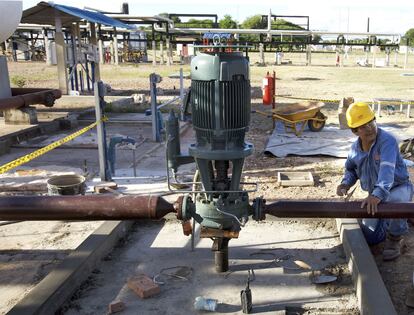Bolivia loses ground as gas exporter in South America
The construction of a new gas pipeline in Argentina is of concern to the Andean country, which is losing one of its main export markets as it struggles with its first economic crisis in decades.

Bolivia is about to lose the market that pays the best prices for its gas: Argentina. On July 9, Buenos Aires inaugurated the first phase of the President Néstor Kirchner Gas Pipeline. It’s a blow to Bolivia, as it will close off the gas market in its southern neighbor. Bolivia makes $600 million from its gas imports to Argentina, and losing this revenue will take a toll on the country, which is experiencing its first economic crisis in two decades.
The new Argentine gas pipeline is projected to extract up to 21 million cubic meters of gas per day from the Vaca Muerta fields, in southern Argentina, and transport it to the central zone of the country. Argentina has also started work on its Northern Gas Pipeline, which today distributes Bolivian gas in the north of the country, so that it operates in both directions. Trade between Bolivia and Argentina will come to an end in 2024, when the countries reverse the positions they have maintained for 20 years. Back then, Bolivia was experiencing a gas boom while Argentina was struggling with an energy crisis.
Thanks to the two pipelines, Argentina plans to save some $2 billion in 2023 and more than $4 billion from 2024. “Gas from Vaca Muerta is six times cheaper than that which is imported,” said the Argentine Secretary of Energy, Flavia Royón, on May 15, when the government celebrated the completion of the first section of the pipeline. Argentina could become a leading exporter of natural gas in the region, a position that is now slipping from Bolivia.
“Argentina has not delivered us a blow. We delivered ourselves the blow,” said energy consultant Álvaro Ríos, in reference to the decline of the Bolivian gas industry due to lack of investment and the resulting lack of new discoveries of gas deposits. “In 2014, we exported 48 million cubic meters of gas per day: today, we can only export 22 million,” he said. “We should be selling 23 million cubic meters to Argentina, but we are only giving it four to eight million cubic meters a day. That is why the contract will no longer last until 2027, as planned, but will end next year.”
The Bolivian government of Luis Arce is seeking to expand the exploration of new deposits and earmarked $326 million this year for the project. It hopes this investment will make up for the poor performance Bolivia has seen in recent years. An official report indicates that, between 2005 and 2020, 192 wells were drilled and that existing production barely rose by 2%. Two months ago, Arce inaugurated the Yope-X1 well, but its commercial potential has yet to be confirmed. Ríos is skeptical about the possibility of new discoveries changing the situation. “An exploratory cycle lasts 10 years, so I don’t think there will be any changes; what is going to happen with Argentina cannot be reversed,” he said. Ríos calculates that by 2029, Bolivia will even stop exporting gas to Brazil, the only market it will have left when trade with Argentina ends next year.
This is due to the lack of reserves. The shortages are so severe that Bolivia could even become an importer of Argentine gas. “It’s good that we have a neighboring country with gas, that will be useful to us in the future,” said Ríos. The expert thinks that Bolivia’s future role in the regional energy game will be to rent its pipelines, which are connected to São Paulo, so that gas from Vaca Muerta is pumped through them to the Brazilian metropolis. Other Bolivian analysts are somewhat more optimistic, but in general it is thought that Bolivia should back industries other than gas.
The situation is of concern to southern Bolivia, which produces the most gas is the country. Óscar Montes, the governor of the Bolivian region of Tarija, which borders Argentina and is the main center of gas production, has called for other alternatives to be considered, arguing that the declining regional gas industry, which has been suffering from the production crisis since 2015, needs to move to new areas.
The current Bolivian government says that previous administrations made a big mistake by not investing more in gas exploration and by not implementing the incentive program for foreign oil companies that had been designed to anticipate future shortages. The ruling party strongly criticized a former minister who publicly told then-president Evo Morales that there was nothing to worry about as Bolivia was floating on “a sea of gas.”
Sign up for our weekly newsletter to get more English-language news coverage from EL PAÍS USA Edition
Tu suscripción se está usando en otro dispositivo
¿Quieres añadir otro usuario a tu suscripción?
Si continúas leyendo en este dispositivo, no se podrá leer en el otro.
FlechaTu suscripción se está usando en otro dispositivo y solo puedes acceder a EL PAÍS desde un dispositivo a la vez.
Si quieres compartir tu cuenta, cambia tu suscripción a la modalidad Premium, así podrás añadir otro usuario. Cada uno accederá con su propia cuenta de email, lo que os permitirá personalizar vuestra experiencia en EL PAÍS.
¿Tienes una suscripción de empresa? Accede aquí para contratar más cuentas.
En el caso de no saber quién está usando tu cuenta, te recomendamos cambiar tu contraseña aquí.
Si decides continuar compartiendo tu cuenta, este mensaje se mostrará en tu dispositivo y en el de la otra persona que está usando tu cuenta de forma indefinida, afectando a tu experiencia de lectura. Puedes consultar aquí los términos y condiciones de la suscripción digital.








































